#Sowjet
Explore tagged Tumblr posts
Text
Die Rückkehrer
Die Armeen auf beiden Seiten haben sich bis auf Äußerstes abgerieben, in der Ukraine, einem Land das fünf Mal weniger Bevölkerung als Russland hat, haben drei Viertel aller Haushalte inzwischen einen Familienmitglied zu beklagen, der im Krieg gefallen ist oder verletzt wurde, in Russland beziffert sich deren Anteil auf 15%. Ein Frieden wäre für die beiden Seiten dringend nötig. Doch wie gefährlich könnte ein plötzlicher Frieden für das russische Regime sein? Was ist mit den Rückkehrern? Etwa eine halbe Million Menschen kehrt von der Front zurück. Sie haben drei Jahre lang in einem fremden Land Menschen getötet. Die meisten sind aus den armen russischen Provinzen in die Ukraine gegangen. Werden sie sich benehmen, wenn sie zurück in ihre kleinen Heimaten kommen? Das Rückkehrerproblem ist nicht neu. Es wurde in einigen russischen und in unzähligen amerikanischen Actionfilmen thematisiert, bekannt als Rambo Komplex - Menschen, die aus der Hölle des Krieges zurückkommen und keine entsprechende Ehrung finden, leiden unter posttraumatischen Belastungsstörungen und sind besonders reizbar. Sie können wie Rambo eine Hyperaktivität entwickeln und die halbe Stadt in Schutt und Asche legen. Wenn John Rambo noch mit einem Riesenmesser durch die Stadt lief, würden die Rambos des aktuellen Krieges, viele von ihnen sind gut ausgebildete Drohnenführer, wahrscheinlich sich eine Drohne besorgen, die mit einer Granate in jedes Fensterchen reinfliegen kann. Sie könnten Fragen an die Regierung stellen, ob sich das ganze gelöhnt hat, angesichts der bescheidenen Eroberungen. Sie könnten aber auch depressiv werden, Die Selbstmordstatistik unter Vietnamveteranen in den USA glich einer Pandemie. Aus Erfahrung weiß man, dass unter posttraumatischen Verhaltensstörungen Leidenden nicht gern zum Arzt gehen, weil es sich für „echte Männer“ nicht gehört, mit Psycho-Klempner zu reden. Es werden bereits jetzt in Russland die Broschuren gedruckt und in den Haushalten verteilt, die einen Rückkehrer zu erwarten haben. Die Frauen werden darin unterrichtet, wie sie ihre vom Krieg beschädigte Männer empfangen sollen. „Grüßen Sie ihren Mann nicht von hinten“ steht in den Broschuren „Zeigen Sie ihm Respekt“ „Vermeiden Sie jeden Streit“ und „Tolerieren Sie den Wunsch ihres Mannes in Kleidung zu schlafen“. Gleichzeitig bekommt das Kulturministerium den Auftrag zur Heroisierung der Kriegsveteranen, ein Heldenepos muss möglichst breite Schichten der Bevölkerung ansprechen, damit keine unnötige Fragen aufkommen, wofür hunderttausend starben und noch mehr Menschen verletzt wurden. Es wird für die im Land verbliebenen Kulturschaffenden kein leichtes Brot sein, diesen sinnlosen Krieg und das Verhalten der russischen Okkupationsarmee in der Ukraine zu ehren, angesichts der großen Verluste und fragwürdigen Eroberungen, aber sie werden es sicher schaffen, der Tag des Sieges im Zweiten Weltkrieg wird Hilfe leisten, immerhin jährt sich dieser Sieg in Mai, 80 Jahre, das wird eine Orgie sondergleichen. Das Land wird von einem patriotischem Propaganda-Tsunami überschwemmt, um den Rückkehrern das Gefühl zu geben, nicht umsonst in dem Nachbarland gekämpft zu haben. Doch kein Staat kann den richtigen Umgang mit Rambos. Schon damals als die Sowjets aus Afghanistan zurückzogen, haben die Rückkehrer, in einer unvergleichlich geringerer Zahl ( hundert mal weniger) eine tiefe Blutspur in der Kriminalstatistik des Landes hinterlassen und für viel Ärger gesorgt. Diesmal kann der Frieden für Russland noch blutiger werden.
14 notes
·
View notes
Text
Matteo schaut spatort - teil 2
-back at: ich erkenne schon wieder Schauspieler*innen
-UND PLÖTZLICH HAT GIRLY NH PFEIL IM BEIN WÄHRENDDESSEN ICH DAS HIER SCHREIBE
-JAMAN BBG FLASHBACKS 🙏🏻
- "junge du brauchst Therapie" - Zitat rey
-ja ich wünschte auch der Vater wäre tot
-Adam gibt mir so gender envy es ist unglaublich
-AN SEINER STELLE WÜRDE ICH DEFITNIV NICHT NACHHAUSE KOMMEN??
-okay watch me crying over this "silly" conversation Adam just had with his mom
-WAS FÜR VERZEIHEN? VERZEIHEJ MEIN ARSCH
-"schubs ihn ins schwimmbecken hab ich gesagt!" - Zitat rey Nummer 2
- vielleicht ist Adams Frisur diese Folge nicht so hübsch wie sonst, aber dafür sind nicht gefühlt 300 filter auf die Szenen gepackt
-Warum eigentlich plötzlich neues Polizeipräsidium?
-"Wir Leo" Zeit für die sowjet Union Hymne
-oh oh der bunker ist back
-ES TUT DIR DEFINITIV NICHT LEID?? HÖR AUF?? HALT DIE FRESSE?? NIEMAND BRAUCHT DEINE "HILFE"??
-WARUM FASST ADAM DEN PFEIL OHNE HANDSCHUHE AN?? IST ER DUMM ODER SO??
-"real-life Tarzan" - Zitat Lisa
-ADAM MEIN BBG ICH WILL IHN SO UMARMEN
-ADAM WARUM TUST DU DAS? WARUM HILFST DU IHM?
-will garnicht wissen wie anstregend es war die kickerszene zu drehen
-jetzt sprechen die plötzlich französisch, hilfe
-sassy Leo ist mein lieblings leo
-bro kein 19 jähriger sagt 'scharf wie Rettich'
-alter da bin ich kurz am handy plötzlich liegen die beiden da und verbluten total
-Adam schürk the man you are 😩
-NEIN BITTE LASS DEN VATER SICH NICHT DRAN ERRINERN 😭
-okay bro ist seit fucking 2 Monaten erst aus dem Koma raus aber kann schon trainieren Pop off bestie
-der Vater ist so jumpscare
-OCH NE HALT DIE FRESSE BITTE DAS WÜRDE UNS ALLEN GUT TUN
-WIE ER DA DUMM SITZT UND LÄCHELT ALTER
-und der award für die unnütze Mutter ever geht an Heide
-na mensch Adam das ist aber machtmissbrauch
-jeder Vater in Saarbrücken ist einfsch ein hurensohn
-alter was zum fick geht hier ab??
-DANKE FÜRS ANFAHREN OMG hat der wichser verdient
-"Menschen jagen - ein total normales Hobby in Saarbrücken" - Zitat Tamara
-JA BITTE BRING DEN VATER UM, DANN SIND WIR ALLE GLÜCKLICH
-LEO POOKIE YOU DID IT U SHOT HIM (Auch wenn ich erst gewartet hätte, bis Adams Vater die Ecke rum wäre)
20 notes
·
View notes
Text
Ok eigentlich wollt' ich einen kleinen Aufsatz über verschiedene Final Problem Adaptionen machen aber irgendwie hab ich's halt verpennt also müssen wir jetzt mit dem arbeiten was wir haben und das ganze wird eher ein Schwätzchen als ein Aufsatz.
In der Sowjet Holmes Version wird in FINA gar kein Deutsch gesprochen, dafür haben wir in "The Twentieth Century Approaches" bzw deren Version von Engineers Thumb deutsch das sogar so klingt, als wären es fließend gesprochen. Fand ich witzig.
In der Bert Coules Radio Adaptation haben wir sowohl in FINA als auch in Devil's Foot Holmes der deutsch spricht! Und auch wenn ich ein bisschen gebraucht habe um zu realisieren, dass es Deutsch ist, finde ich Holmes macht einen guten Job und um ehrlich zu sein, ganz schön beeindruckend einfach so Wagner auf Deutsch zu zitieren für ihn. In FINA selbst haben wir ein bisschen Deutsch, die Szene an die ich mich aber wirklich erinnere ist, als Watson zum Hotel zurückkehrt und Holmes sich nach dem Jungen umsieht der die Nachricht bzw. den Brief zu ihnen gebracht hatte. "Mein Junge? Mein Junge?" ist einfach in mein Gehirn gebrannt.
Ok hab doch noch Granada Holmes gestern geguckt also hier auch noch die Gedanken dazu: es wird auch nicht viel Deutsch gesprochen aber der Schauspieler von Herr Steiler spricht Deutsch und ich denke aus dem bisschen Deutsch ("Also. Gute Reise.") kann man das auch ein bisschen raushören. Er sieht zumindest so aus wie mindestens 5 älterer Herrschaften denen ich begegne wenn ich in die Stadt gehe.
Zu guter Letzt:
#Sherlock Holmes#German#ich hab das Gefühl mir fehlen diverse kommas aber da haben wir jetzt keine Zeit für ich muss zur Arbeit
21 notes
·
View notes
Note
Hello! Since today is the 107-Year of independance for Finland, how do you think WW2 would have played out if Stalin didn t attack Finland? Would Hitler still have attacked the Sowjet Union without proof of how incompetent the Red Army was at that point?
More than likely. Hitler had always planned on expanding eastward to fulfill his dream of Lebensraum and deeply distrusted the Soviet Union and Bolshevism. Hitler may have decided to wait until after he crushed the UK, but without any actual ability to threaten the British mainland, that is extremely unlikely to actually happen.
However, the Red Army did realize just how terribly they performed in the Winter War, which means that it's entirely possible that the early onset of this new Barbarossa becomes even more of a disaster for the USSR. The Soviet Union performed abysmally in 1940 and were making strides to improve themselves in 1941; a Soviet Union without that kick might atomize rapidly as the poorly-trained Red Army flees.
Lest this be taken as a backhanded approval of the Winter War, I'd like to point out that deficiencies in military capability were well-known to observers. However, Stalin's paranoia and the climate of corruption fostered in the Soviet Union prevented honest accounting, transparency, and results-oriented reforms. So the Soviet Union's poor performance in the early stages of the Second World War are a self-inflicted wound.
Thanks for the question, Rig.
SomethingLikeALawyer, Hand of the King
12 notes
·
View notes
Text

Afraid to Get Close (pt. 1)
secret santa gift for @iftheshoef1tz ❤️ @acotargiftexchange ship: Azriel x Eris type: angst word count: 4,3k words warnings: talks about politics and WW2, mentions of homophobia story masterlist | ao3

The pendulum clock strikes 6.30 pm. The exact moment the little boy on the hospital bed sucks in a sharp intake of air - he is breathing again!
Eris, a rarely-there smile on his lips, stands in the threshold of the large hospital room in the Charité hospital, East Berlin. His tall figure nearly fills out the whole doorframe, his hands are in the pockets of his white, sterile coat, his hair neatly combed back, around him the glow of fluorescent lights and the sounds of many machines running. The mechanic, raw sounds reverberate through his body, but he is already used to them.
A muscle in his jaw feathers from how hard he has been grinding his teeth in the past few minutes, observing the scene with an eagle’s gaze, hoping and praying the little boy gets another chance at life.
His eyes fixate on said young boy lying in the large hospital bed, finally outside the colossal breathing machine he was in only moments ago - the one Eris had ordered his assistants to put the boy in. Each exhale he does on his own is now a hard-fought victory.
His frame is small, yet the decision his parents made tremendous. He wasn't vaccinated.
The West hasn't been vaccinating yet — blinded or driven by complacency, they have overlooked the importance of the vaccination. Polio is spreading rapidly, many kids have fallen ill in the past months. There is no causal therapy for the disease, only through the development of vaccines it can be permanently reduced. In 1960, the Sabin-Tschumakow oral vaccine was administered in the German Democratic Republic for the first time in Germany, and within one year it succeeded in almost completely eradicating spinal Polio in the GDR.
Yet, West Germany is still declining it, which leaves Eris both outraged and bewildered— how could you say no to something that would help so much. He believes the reason for it is that the vaccine comes from the Sowjet union…
He brushes these thoughts away, focusing on the young boy again — another life that has been saved. A sense of relief washes over him when he watches the steady rise and fall of the boys chest. Finally.
The boy's family surrounds him, their faces etched with worry and then slowly transforming into expressions of hope as they witness his shallow breaths become steady and robust once again.
As the room fills with the sound of the boy's regained breathing, the mother, tears glistening in her eyes, whispers, "Thank you, Doktor Vanserra. Thank you so much."
Eris only politely inclines his head, and turns to walk out of the room. He is not one to enjoy such compliments, nor likes receiving them. This is his job, he only does what he has to do.
The door closes behind him and Eris allows himself a moment exhale a long breath and close his eyes. The West needs to start vaccinating, it is an urgency, it can't be postponed any longer.
Eris steps out into the corridor, hoping no one here needs him anymore so he can head home, bathe and then go to the theatre.
He greets a few patients, tilting his chin at them and continues down the cool, white corridor. Only little light flows in through the milk glass windows.
If…if only he could leave his position here and go to West Berlin…he would start vaccinating there, convincing the people of the West of how important it is to start the fight against Polio. But he can't leave this place. For more than one reason. For his job, the life that has been given to him here, the possibilities and prospects and the one person he—
"Herr Doktor," a nurse calls behind him. "Herr Doktor!"
Eris fights the urge to roll his eyes, and looses a long breath. Many doctors have left the Charité in the past months, leaving them with a medical staff shortage in the hospital. He knows if he leaves the Charité as well it will only get worse, but what about the people in the West? The children. But the West…he couldn’t be himself there either…he would also have to hide - hide behind a mask.
"Herr Doktor! Emergency in room four. Young woman, severe nausea—"
He turns to Schwester Cerridwen, a frown on his face. "Make sure she rests and give her some—"
"She is throwing up blood, Herr Doktor." Nurse Cerridwen's gaze is hard, the urgency flashing brightly in her eyes. "A lot of blood!" She makes a movement with her hands to accentuate her point.
Eris understands — throwing up blood is never good. He swiftly follows after Schwester Cerridwen, washing his hands when he enters the room, disinfecting them and then strolls over to the patient, already lying on the hospital bed. Doktor Madja is at her side, her fingers pressing down on the patient's stomach.
"Swollen abdominal wall. Constant feeling of nausea. Very low blood pressure." Madja lifts her gaze to Eris and dips her chin.
The look in her eyes speaks volumes, but Eris wants to double check. Many illnesses can have the same symptoms, you shouldn't rush to conclusions too easily — at this point her symptoms could point at anything.
He takes over, Madja lifts her hands and steps back, gently pushing up the woman's blouse a little. Eris starts to feel her lower belly, from left to right, then from right to left, making sure there is no hardening of any organ. "Frau—"
"Emerie. Just Emerie." There is a sad smile on her lips when she turns to Eris, searching his gaze, but he avoids it.
He doesn‘t like eye-contact with patients, not when their state is yet unclear. They always try to read something in his gaze, something that is not there. Most of the time he is just concentrated and focused and people would often interpret these expressions as worry. But he is hardly ever worried. This is his job.
"How much weight have you lost in…let's say, the past six months, Emerie?"
"Not much. Maybe, one or two kilogram."
This is not bad, Eris thinks, yet doesn't let it show on his face. "Lack of appetite? A feeling of fullness? Anything like that?"
Tarquin, one of the trainee doctors, is meticulously taking notes, scribbling everything down the doctor says, his fingers quickly gliding over the keys of the typewriter.
Eris's cool hands move higher, pressing down just above her stomach and a cry parts Emerie's lips. She slams her lips together, and fights against the tears that have started to build up in her eyes. She blinks rapidly and sucks in a sharp breath.
"It's not cancer is it?" she then asks in a voice filled with terror and panic.
Now, Eris meets her gaze and slowly shakes his head. "No. No, I don't think so. Gastritis. Quite severe. You should have come a lot earlier."
"My father wouldn't let me…" She presses her lips together again — if he cares, Eris does not let it show. This is private business and nothing he should care about. His work is solely in the hospital…
"The blood comes from the gastritis, Schwester Nuala, I need you to collect an antiacid and two doses of antibiotics. We need to keep you here over night, probably for a few days if needed."
"I can't—my father—"
"You are not going home tonight. Not in your state. If your father has a problem with it, he can ring me and I'll explain the situation to him. Or he can come here, but you won't be leaving this hospital. Not under my watch." There is no room for objection, neither his tone nor his statement would allow it.
Eris gently pulls down her blouse. Then his eyes and eventually his hand land on her upper arm. He lifts up her arm, thumb brushing over the dark skin, the imprint of finger tips. Bruises. The kind of bruises he knows all to well. The kind of bruises his father had left on his skin when he was a young boy. The kind of bruises that cause much greater damage to your heart than to your skin.
"I assume this is not from the gastritis?" Eris raises his brow and a glimmer of shock and panic flashes in Emerie's eyes. She starts to shake her head and parts her lips, yet for a moment no words leave her. Then, "I must have hit myself somewhere. It's nothing," she says, her voice wavering the slightest bit. It is not Eris' place to question her further. His job is done here. He lowers her arm, although a bolt of hurt darts right into his heart. He feels…He shakes his head. He feels nothing.
"You are taking over?" he asks Madja when Nuala returns with the medicine. The female doctor nods, and smiles at Eris.
"The last ones," Nula says with a huff when she places the small bottle on the bed next to Emerie. "The haven't delivered properly in weeks."
"I'll make a call before I leave." Eris walks over to the basin, washing his hands again. He is not in the mood to chat any longer. He will make a call and hope for the best. It is what they have been doing for months now. Deliveries have come only sporadically in the past few months, and everyone inside the hospital is hoping for it to get better soon. They need the medicine…
"Have a good night," he says and opens the door. "I'll check on her tomorrow morning."
He is already nearly out of the door, when, "Nuala, a word." He waves her over with two fingers and the young nurse follows without a word. Once outside, and only when the door is closed does he speak to her. "Our patients don't have to know how low our stock of medicine is. This is hospital business, do you understand?" His voice is soft, the reprimand in his statement loud and clear. "I want nothing like this to happen again."
"Of course, Herr Doktor. Apologies, Herr Doktor." She bows her head, and curtsies a little.
"Oh, and Schwester Nuala, make sure she really stays in bed and does not try to get home. If she can't sleep, give her some Valerian."
Nurse Nuala gets dismissed with the wave of the same two fingers she has been called over. Her head lowered, she returns back into the hospital while Eris sets out for his office - or rather the room he does all his research in.
Shrugging out of his sterile coat, hanging it up, and collecting all his things, Eris is in a rush to get to the theatre as fast as possible. He is nearly out of the door when he remembers the phone call he has to make. So, doing that as well, makes him already twenty minutes late…and he isn't even at the theatre yet.
Eris knows that the moment he steps outside, and the warm evening air of late August greets him, that watchful eyes and wide open ears lurk behind every corner — making sure no one puts a toe out of place, or says one wrong thing about the authority.
The city is cloaked in tension and unease. It is not always palpable, but still the feeling of being watched, and followed never fully vanishes.
With implementing the Stasi the GDR introduced comprehensive surveillance. All citizens are controlled either through informers or the police, and communication is often monitored.
Despite the warm summer evening, Eris shudders at the thought.
This is all done in order to suppress opposition and create a climate of fear — freedom of expression is restricted, creating a sense of unease among the people. What a place to live in, Eris thinks but does not allow himself to dwell on these thoughts for too long. He wants to enjoy the evening.
He lifts his gaze, observing his surroundings.
The sun is slowly starting to set behind the towering buildings, some still marked by the happenings of World War two, casting long shadows on cobblestone road Eris is walking down
You can see spots where the walls were hit by pieces of bombs or bullets. Some parts look patched up, showing where repairs were made in a hurry during the war.
His gaze is trained on the ground beneath him, hands in the pockets of his trousers, a cigarette between his lips. He doesn't want to rush to the theatre, not draw any attention to him — not more attention that he already has on him.
"Guten Abend, Herr Doktor!"
"Guten Abend, Frau Oberlehrerin." Eris merely tilts his chin at Nesta Archeron. She is pushing a little pram in front of her. Her little son, just like his older sister were both born in the Charité and although Nesta and her husband pretend to be happy citizens of East Germany suspicions about them wanting to leave for West Germany are loud. They probably only want to follow their family, Eris thinks and walks past Nesta without another word.
Finally arriving at the theatre after a few minutes of walking in complete silence, only the chirping of birds and some vehicles in the distance audible, Eris exhales loudly. A breath of relief.
It is summer, he is wearing no jacket and so he simple walks past the cloakroom and pays for his ticket for the evening show. It isn't the first time he is late to a show, and so the people working there already know him, and gladly open the door for him — he after all is said to be the best doctor in East Berlin, and everyone hopes to be treated by him in case of an emergency.
After thanking the young clerk who holds the door open for him, he slips inside, his hurried footsteps softened by the plush carpeting. The door closes behind him, and Eris breathes a sigh of relief and stays by the door for a moment longer, overlooking the place.
The theatre hall shows plush red velvet seats arranged in a stadium-style around a single stage, framed by heavy velvet curtains. On the stage, the orchestra. His orchestra.
He allows himself to breathe in - deeply. Finally some well-deserved peace — hidden by the cover of darkness and embraced by the beguiling melody of the assemble playing in the theatre this evening.
He sets out for the back row, slides into a seat, the upholstery yielding beneath him and then relaxes. And then the music truly seeps into his ears.
Tchaikovsky.
They are nearly through half of the Overture 1812, and it sends a pang of hurt right to Eris' heart. Azriel always makes his ensemble, consisting of brass band, woodwinds, percussions and strings, play Tchaikovsky when he knows Eris is coming to see the show.
The doctor is a constant guest - the theatre has become a wonderful distraction to his otherwise rather mundane life. He loves it here — it brings him joy.
They are reaching the crescendo when Eris finally searches for Azriel. The man is standing in front of his orchestra, tall and almost a little majestic looking. His broad, sculpted shoulders are even visible through his dark blue tailcoat. The spotlights from above create an atmosphere that almost make it look like shadows dance around Azriel and with every move of his hands it seems like he is moving the shadows, controlling them.
Eris averts his gaze and then closes his eyes, only listening for a moment.
Playing Tchaikovsky — it is Azriel's way of telling Eris how much he means to him…or so Eris thinks. Maybe it is also just sheer coincidence, but since the moment he has mentioned that Tchaikovsky is his favourite artist Azriel has, without exception, always played one of his pieces when Eris came to see his show.
The doctor hates himself for having nearly missed the whole performance. He folds his hands in his lap, and tips his head back the slightest bit, eyes opening. Here, sitting in the last row, hidden in the shadows, he can admire…his—Azriel.
He can admire Azriel.
Here, in the shadows he is safe. Here, in the shadows he does not have to hide his true self.
The stage is bathed in a soft, dim light, creating an intimate atmosphere in the theatre and for the first time this evening the doctor feels at ease. He watches the small orchestra assemble and then looks at Azriel again, watching him intently. How he acts on stage. Eris' eyes follow every gesture and movement of Azriel's hands. His hands—
Momentarily, Eris is taken back in time. A few years actually. To the day he first met Azriel.
Azriel was born into a Jewish family, and was part of the large emigration in the 1930s, fleeing from the rising Antisemitisms and the Nationalsozialist regime, to find a new home in England. But after the war, after 1945, in May 1946, Azriel's father, alongside his new wife, and their sons returned to Germany.
Just two weeks prior, in April 1946, Eris had passed all his medical exams with flying colours, earning him the title of the best medical student of 1946 in Vienna and the youngest graduate. He quickly received an offer to work at Charité, specialising in forensic medicine, a subject he had focused on in his doctoral research.
In an unexpected turn of events, Azriel became one of Eris's first patients when the on-duty doctor needed assistance with a patient whose hands were said "to be on fire". Eris was initially skeptical of the nurses' description, thinking they were behaving a little over-dramatic, but understood the urgency when he saw Azriel's badly injured hands. It was clear that Azriel's injuries hadn't been an accident — he never revealed what had happened though. Eris had treated him back then, and they had exchanged a few words — nothing much, only the most necessary things
In the years that followed the incident, Eris and Azriel occasionally crossed paths until—
Applause and cheers interrupt Eris's thoughts, fetching him back to the moment in the theatre and he joins in, clapping his hands.
Overture 1812 has come to an end, and slowly Azriel turns to the crowd, his baton pressed to his chest. He bows at the waist and when he lifts his gaze, it lands directly on Eris.
It always does. He always finds him in the audience.
Their eyes lock across the dimly lit theatre, and a silent understanding passes between them. Azriel's gaze lingers on Eris, full of longing and pain, a silent thank you for coming to see the show. Eris, overwhelmed by the intensity of their prolonged eye-contact suddenly feels everyone's attention on them. He can only offer a subtle nod, his own eyes reflecting the pain and yearning they both feel.
Azriel, his eyes brimming with the unspoken pain, quickly lifts his gaze, looking over the crowd before he turns back to his orchestra.
✦ . . ˚ . . ✦
"Waiting for someone?" Azriel's velvety voice slides over Eris' skin like an artist's brush on a canvas.
Eris straightens up from where he has been leaning against the big oak tree outside the theatre, observing the city that slowly entered the night. Hardly anyone is around anymore, everyone returning to houses.
"I'm smoking." The doctor's statement seems matter-of-factly and Eris doesn't even deign Azriel a glance.
"As a doctor, you should know better than to smoke." The amusement in Azriel's voice is loud and so is the paradox reprimand (he is smoking himself), and it makes Eris turn his head to the side. "Fire?" he offers.
Azriel bows his head, his cigarette already between his lips, shoving the yellow-green Juwel cigarette package into the chest pocket of his shirt. Eris lifts his hand, lighter between his fingers giving Azriel fire. The moment is so intimate, the doctor's fingers nearly brushing Azriel's full lips, it makes Eris grind his teeth, hard, and despite the cigarette in his mouth.
"Did you enjoy the show?" Azriel asks, taking his first pull on the cigarette, slowly blowing out a puff of smoke.
Eris is about to answer, but gets interrupted by Tamlin Frühling.
He walks by, and gives them nod and, says, "Guten Abend, Herr Doktor. Guten Abend, Herr Direktor!" He taps his head and walks past Eris and Azriel.
Eris visibly tenses, his breath catching in his throat, but he politely bows his head at the violinist of Azriel's orchestra.
"Until tomorrow evening," Azriel tells the blond. "Guten Abend!"
Once the man is out of earshot, Eris exhales a sigh of relief. He closes his eyes for a second and then flicks his cigarette away, stepping on it to extinguish the flame.
"I don't know why you're always so nonchalant about this, Azriel. What if someone sees us? Someone we know."
Azriel takes a long drag from his cigarette, his features lit by the soft glow of the small flame. "No one we know is here, Eris. It's just us. There is barely anyone around, and what would happen — we are two men smoking together. That isn't forbidden."
Eris paces back and forth, his anxiety palpable, his tension just as strong. "But you never know who might be lurking in the shadows." Eris looks over his shoulder. "The Stasi officials have their eyes everywhere."
Azriel shakes his head, seemingly unfazed and then rolls his eyes. "Eris, we've been careful for so long and we've talked about that so many times. They might have their spies in many places, but not everywhere. No one is around. And besides, we're only smoking outside. There's no harm in that."
Eris shoots Azriel a frustrated look. "It's not about the smoking, Azriel. It's about us. Don't you think people get suspicious of us."
"No," Azriel grumbles. "Why would they? We could be friends, you know. Hanging out because we are friends."
"But friends don't—"
"Fuck?"
"Keep your voice down!" Eris snaps, his tone hushed.
Azriel's eyes darken with anger. He steps closer to Eris, their faces only inches apart. "Or what? What will you do?" His nostrils flare. "Don't you think I am aware about how dangerous this is? How careful we have to be? I am not an idiot."
Eris's anger softens as he gazes into Azriel's eyes, filled with longing and hurt. "I know, Azriel…"
"I don't think you do. You think that I want to go around parading my love for you. You think I would be foolish enough to reveal this relationship. You don't know that I am happy with our secret meetings. That I find it alright to love you in the shadows."
Azriel leans in, their lips almost touching. The breath he blows out through his nose tingles Eris' face. His eyes dip to Eris' lips. But he lifts his gaze again, staring straight into the amber eyes of his lover. The doctor is a little taller than him, just the tiniest bit.
"I want you. I want you more than anything in this life. I want you more than this damn position in the theatre. I want to spend the rest of my life with you. But, I am alright with us pretending to be friends when outside if that is the only way I can be with you more often than in those fleeting, hidden moments." Azriel swallows, his Adam's apple bobbing.
"But I won't continue like this, not even being able to normally talk to you once we are outside, always living in fear. I'm not afraid that someone sees us, because all they will see are two men — we don't have homosexual written across our forehead, Eris."
"Azriel," Eris whispers, but he actually doesn't know how to continue. He can't do anything against his fear. His paranoia. He is scared, and he…Someone has been following him lately. He knows this. He hasn't shared it with Azriel yet, not wanting to worry his lover. But he knows someone is watching him and it might be for this reason. For him being intimate with a man.
Azriel draws in a deep breath and glances around. "No one is around, you don't always have to look for danger where there is none."
Their breaths mingle, and they share a moment of just looking into each other's eyes, the weight of their love hanging heavily in the late summer evening air. The tension between them builds, and for a moment, it feels as if they might finally give in to their desire.
"Leaving would make many things easier," Azriel breathes, and Eris finds himself nodding. Azriel has mentioned leaving a few times, but Eris doubts he would actually risk his life for it.
His gaze drops to Azriel's lips, lingering. It is almost like he can still feel their last kiss, feel the softness of Azriel's lips against his, taste him. This stole moments, where it is just them. Those explorative touches, the soft sighs and moans. Their bodies moving against each other.
Eris sharply pulls away. He steps back, his eyes filled with a mix of regret and sorrow. "I can't, Azriel. Not here. Not now. I can't"
Azriel, though disappointed, nods in understanding. He takes a final drag from his cigarette and exhales the smoke slowly. "I know, Eris."
Eris forces a weak smile onto his lips and wants to open his mouth to say something, but Azriel beats him to it. "Can I see you on Sunday? You could come over to my place. Saturday doesn't work…it's Shabbat, with the family."
But Eris shakes his head. "I don't know. I don't think it is a good idea."
Pain flashes across Azriel's features.
"I think I need some space." Tears glisten in Eris's eyes as he gazes at Azriel. "I need to think."
Regret fills the air as Eris turns and walks away, disappearing into the late summer night, leaving Azriel standing alone. The sadness of their situation hangs heavily over them.
Cause space is just a word made up by someone who's afraid to get close.
azris tags: @azrielsbabyg @lady-riel @moonlightazriel @aayo-whatt @brekkershadowsinger @ladyelain @banasheefan56 @a-frog-with-a-laptop @ofduskanddreams @acourtofladydeath @secret-third-thing @born-to-riot
53 notes
·
View notes
Text
Die Außenseiter aus Afghanistan
Mein Vater war Maoist in Afghanistan.
Er gehörte einer kleinen, fast vergessenen Fraktion an – jenen, die inmitten des Lärms des Krieges nicht nach Macht strebten, sondern nach Gerechtigkeit.
Sie nahmen keine Waffen von den Amerikanern, wie die Mudschaheddin, die Frauen verachteten und sich im Blut der Unschuldigen suhlten. Sie waren auch nicht wie die Sowjets, die mit ihren Panzern über Träume rollten und den Sozialismus verrieten, den sie einst verkörpern wollten.
Mao hatte stets gewarnt: Dass der Verrat am Sozialismus nicht von außen, sondern aus den eigenen Reihen kommen würde. Mein Vater glaubte ihm. Nicht blind, sondern mit einem Herzen, das sehen konnte.
Und doch – auch wenn mein Vater zu der kleinsten aller Fraktionen gehörte – war es die ehrlichste, die aufrichtigste. Eine Bewegung, die nicht das Land wollte, sondern seine Menschen. Eine Bewegung, die für Frauen spricht, für Bildung kämpft und für die Hoffnung auf eine gerechte Zukunft. Den Weg meines Vaters trage ich in mir wie ein altes Lied - leise, aber unvergesslich. Ich bin sein Kind und ich werde immer stolz auf ihn sein.
In Afghanistan war meine Familie wie Fremde im eigenen Land. Wir waren Außenseiter. Die Leute nannten uns die „komischen Maoisten“. Meinen Bruder rief man „Mao“, manchmal spöttisch, manchmal einfach, weil man keinen anderen Namen für ihn fand.
Wenn ich heute unter Linken den Namen Mao erwähne, ernte ich leere Blicke oder scheue Distanz. Sie kennen ihn nicht – nicht den Menschen, nicht die Idee, nicht das, was in den Herzen derer lebte, die ihn wirklich verstanden.
Aber mein Onkel, der kaum Bücher gelesen hat, liebt diesen Mann. Weil er in ihm das erkennt, was auch mein Vater sah: Dass Mao den Mut hatte, einen anderen Weg zu gehen. Einen Weg, der voller Steine lag, aber aufrichtig war. Und mein Vater ging auch diesen Weg – schweigend, standhaft, mit dem Herzen bei den Menschen. Ein Weg, der nicht bequem war, aber nie die Würde verriet.
Die Revolution ist für mich etwas anderes als für viele andere. Sie ist für mich kein bloßes Symbol, sondern der Traum meiner Familie und der Grund, weshalb ich ich überhaupt existiere. Ich trage diesen Traum wie ein leises Feuer in mir. Er brennt leise in mir, aber er erlischt nie, weil ich mit Stolz das Erbe eines Revolutionärs trage.
Auch wenn mein Weg ein anderer ist als der meines Vaters, auch wenn meine Kämpfe andere Formen tragen, so bleibt das Echo seines Mutes in meinen Schritten spürbar. Deshalb ist es in Ordnung, dass ich in meinem Leben oft allein war mit meiner Meinung –weil mir die Welt immer wichtig war, schon als Kind, wie jetzt auch als Erwachsene. Die Wahrheit steht selten in der Mitte – sie steht am Rand, bei denen, die man Außenseiter nennt. Und meistens haben sie recht.
- Azada
2 notes
·
View notes
Note
5. favorite color.
6. what kind of music do you listen to?
12. favorite animal.
20. something most people don’t know about you.
27. favorite book
30. top 5 favorite movies.
34. most embarrassing thing you’ve done
44. favorite food
79. what’s the weirdest crush you have ever had?
hehe hii ty for the asks i'm so gonna type too elaborate answers to these 😝🙏😘
5. red. or green. (or black.)
6. i listen to all kind of bullshit, depends on my mood. i enjoy house/club music as background music. David Bowie was my top artist in 2022 & 2023 and i like 60s-70s-80s pop & rock. indie is nice! but i also like cunty shit like ayesha erotica or madonna or drag queen music (rupaul was in my top artists of 2024 and i AM ashamed). OH and recently a lot of berlin rave-pop (Ski Aggu, Ikkimel, Filow, Tiefbasskommando...)
12. cats!!!
20. this is HARD! i think i come across more confident and mean than i am, so like, the extent of my self-consciousness. and for a more fun answer: my family is from eastern (ex-sowjet) germany and the family history is just downright crazy.
27. My Year of Rest and Relaxation is really good! And Wir Kinder vom Bahnhof Zoo by Christiane F. (english: Zoo Station) is a german cult classic i've been obsessed with for years, it's got a famous 80s movie featuring Bowie. But it's VERY dark.
30. Bones and All. Harry Potter 3. The King (2019). Drei Haselnüsse für Aschenbrödel (aka czech-german cinderella, it's a classic and extremely cunty & queer coded). Princess Mononoke. (there are other films i love but these are like my comfort films)
34. too many to chose from ong. um. i once choked on a chewig gum in front of like 40 really cool queer kids i looked up to and it was so bad i fell to the floor and almost fucking died on that gum.. also like.. drunk public making out at parties with questionable people. completely unprompted mental breakdown at a party, lying on the floor sobbing for no reason. i dated a guy i didn't like but who liked me and tried to make it work but it didn't and in the end he turned out gay lmao. there's more but my brain locked it away rn.
44. i'm not picky i think but boring so probably like spaghetti carbonara or smth. ice cream. lahmacun
79. NOW 😭😭😭 this is acc crazy but i've had this crush on my ex physics teacher/principal for years even though he's downright EVIL. he's old (he has grandchildren!!) and he looks SO done with the world, angry lines all over his face, he LOOKS evil. like ong children are scared of him. and he's so meannn. but i was always shit at physics and when i finally got better he was sooo happy and nice abt it and we lowkey on good terms now so yeah. give me that old evil man
ask game
4 notes
·
View notes
Text
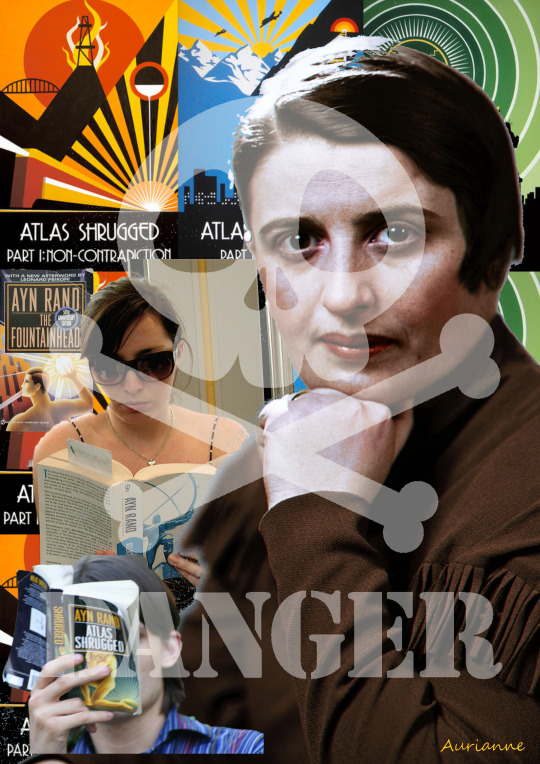
Ayn Rand ist heute populär, aber es führt zur Zerstörung, welche Lösungen gibt es?
Die Gedanken von Ayn Rand tauchen seit Anfang der 2010er Jahre wieder auf. Zwischen 2012 und 2020 stand ihr Buch Atlas Shrugged nach der Bibel auf Platz zwei der meistverkauften Bücher in den USA, 30 Jahre nach ihrem Tod.
Friday essay: We all live in the world of Ayn Rand, egomaniac godmother of libertarianism. Can fiction help us navigate it? – The Conversation: https://theconversation.com/friday-essay-we-all-live-in-the-world-of-ayn-rand-egomaniac-godmother-of-libertarianism-can-fiction-help-us-navigate-it-220326
Alle US-Außenminister, Trump selbst und die argentinischen, deutschen, englischen und italienischen Libertären berufen sich auf Rand, sodass ein starker Vorstoß in Richtung minimaler Regierungen und der Zerstörung von Sozial-, Umwelt- und Gesundheitsstandards zu erwarten ist. Diese Ideologie muss also bekämpft werden, denn theoretisch sollte sie für die Masse der Wähler nicht attraktiv sein. Diese Theorie hat Erfolg bei jüngeren Menschen, die von den Entscheidungen anderer enttäuscht sind und sich nur noch auf sich selbst verlassen und nicht mehr die Entscheidungen anderer erdulden wollen.
Ayn Rand schlug ein Gesellschaftsmodell vor, das einer Handvoll Menschen zugute kommt, die als außergewöhnlich gelten. Warum ist das ein Massenphänomen?
Ayn Rand wurde Anfang des 20. Jahrhunderts in einer kleinbürgerlichen russischen Familie geboren. Zum Zeitpunkt der bolschewistischen Revolution war sie neun Jahre alt. Die Familie verlor viel von ihrem Wohlstand. Sie litt unter dem Gefühl der Deklassierung. Da die Sowjets die Universitäten für Frauen öffneten, hatte sie Zugang zu einer höheren Bildung, die vom Staat bezahlt wurde. In den 1920er Jahren wanderte sie in die USA aus.
Ayn Rand – Wikipedia: https://de.wikipedia.org/wiki/Ayn_Rand
Sie vertritt die Idee, dass einige Menschen außergewöhnlich und begabt sind und die Welt wirklich verbessern können, und diese Menschen sollten nicht durch die Folgen ihrer Handlungen beschämt werden. Es ist zum Beispiel akzeptabel, dass Tierarten oder Menschen sterben, um die Zivilisation zu verbessern, die aus einer Handvoll außergewöhnlicher Menschen besteht. Das egoistische Streben nach persönlichem Vergnügen ist der wichtigste Wert. Die von den Kirchen vermittelten traditionellen Werte wie Altruismus, Hingabe, Teilen und Solidarität ermöglichen es der unterlegenen Masse, die Früchte der Arbeit der außergewöhnlichen Menschen für sich zu beanspruchen. Die Staaten haben die Kirchen abgelöst, um das zu verewigen, was als Diebstahl angesehen wird. Ayn Rand schlägt vor, dass nur die Polizei und das Militär vom Staat übernommen werden sollten. Der Staat sollte sich nicht in das Leben der Gesellschaft einmischen.
The Mike Wallace Interview with Ayn Rand: https://youtu.be/lHl2PqwRcY0?si=ca3iXu_0Olx3uI2D
youtube
Ayn Rand ist eine Neuformulierung von Nietsches Gedankengut. In Jenseits von Gut und Böse gibt es die Idee eines Übermenschen, der tötet, vergewaltigt, aber am Ende der Stärkste ist, der sich fortpflanzt und die Art verbessert. (Übermensch – Wikipedia: https://de.wikipedia.org/wiki/%C3%9Cbermensch)
Ayn Rand überträgt diese Idee auf die wirtschaftliche Ebene, was ihre Ideen akzeptabler macht. Ist das nicht Heuchelei, da der Wirtschaftskrieg, indem er die Mittel der Existenz wegnimmt, die Mittel der Existenz wegnimmt. „You take my life / When you do take the means whereby I live.“ (Sie nehmen mir mein Leben / Wenn Sie mir die Mittel zum Leben nehmen.) Shylock in The Merchant of Venice, William Shakespeare, Act IV sc1.
Warum hängen heute so viele Menschen dieser Ideologie an?
Erstens ist Ayn Rand bei den Chefs von Technologieunternehmen äußerst beliebt. Mark Cuban hat eine seiner Yachten Fountainhead nach dem Roman von Ayn Rand benannt. Larry Ellison, Mark Zuckenberg, Peter Thiel und Elon Musk sind Milliardäre, die diesen Ideen anhängen. Sie betrachten sich selbst als diese außergewöhnlichen Wesen. Sie wollen wie Prometheus sein, der den Menschen das Feuer gab, ohne sich um die Folgen zu kümmern. Sie wollen nicht, dass man ihnen ihre Fehler vorhält, ohne dabei moralische Werte zu berücksichtigen. Die heutigen Technologieriesen berufen sich auf Rand, um sich von Regeln zu befreien und ihr Ego zu erfreuen, sind aber ultrainterventionistisch im Leben des Einzelnen, was sogar Rands Vision widerspricht. Elon Musk will zum Beispiel den Mars kolonisieren oder Implantate in die Gehirne der Menschen einsetzen und muss daher sein Geld nicht teilen oder sich an die Gesetze halten. Diese Milliardäre besitzen etwa zwei Drittel der sozialen Netzwerke, in denen sie für diese Ideen werben.
The new age of Ayn Rand: how she won over Trump and Silicon Valley – The Guardian: https://www.theguardian.com/books/2017/apr/10/new-age-ayn-rand-conquered-trump-white-house-silicon-valley
Zuckerberg’s Libertarianism: Why Do Republicans Embrace Cruelty? (Part 2) – The Hartmann Report: https://hartmannreport.com/p/zuckerbergs-libertarianism-why-do-64a
Zweitens hat das Verfolgen des eigenen Glücks ohne Rücksicht auf die Folgen eine schuldbefreiende Wirkung auf Menschen, die übermäßig konsumieren. Seit Anfang der 2000er Jahre erzeugt das ökologische und soziale Bewusstsein Ängste und Schuldgefühle. Selbst die einfachsten Menschen können sich den Ideen von Ayn Rand anschließen, um diese Schuldgefühle loszuwerden. Pech für die Ärmsten, die unter schlechten Bedingungen arbeiten, Pech für die Umweltzerstörung.
Drittens sind die meisten Menschen angesichts der Probleme in der Welt verzweifelt: Kriege, Umwelt, Sklaverei, … Sie warten auf einen außergewöhnlichen Retter, der alle Probleme löst, einen Messias. Es gibt weniger religiöse Gefühle, aber das Bedürfnis ist immer noch da. Sie sind bereit, ihre Freiheit und einen Teil ihres Lebensunterhalts zu opfern, um außergewöhnlichen Wesen die Möglichkeit zu geben, Lösungen zu finden. Open Ai schlägt zum Beispiel vor, dass künstliche Intelligenz die Landwirtschaft verwalten soll. Ihrer Meinung nach sollte man sie einfach machen lassen und sie nicht mit Gesetzen behindern.
« Trump et Musk nous mènent vers un monde glacial, dominé par l’IA » – Reporterre: https://reporterre.net/Trump-et-Musk-nous-menent-vers-un-monde-glacial-domine-par-l-IA
AI seen as possible saviour in tech sector’s environmental struggles – The Brussels Times: https://www.brusselstimes.com/688771/ai-seen-as-possible-saviour-in-tech-sectors-environmental-struggles
Religions, Values, and Peak-Experiences, Abraham H. Maslow
Viertens wird seit dem Zweiten Weltkrieg die westliche repräsentative Demokratie als das Absolute der Demokratie angesehen, wie Francis Fukuyama in The End of History nachgewiesen hat. Dieses System ist derzeit das demokratischste, aber es ist bei weitem kein Absolutum. Es ist das Volk, das aus einer Auswahl von Eliten wählt, die alle mehr oder weniger das Gleiche vorschlagen. Dies ist nur ein Schritt auf dem Weg zur Demokratie. Diese Eliten haben sich in alle Lebensbereiche eingemischt und Partikularinteressen statt dem Allgemeinwohl gedient, z. B. indem sie für Ölkonzerne Krieg führten, Pharmakonzerne nicht verurteilten, die Menschen vergifteten, oder Steuergelder einsetzten, um die Profite der Bankaktionäre zu retten. Indem er sich so verhält, kommt der Staat seinen Verpflichtungen nicht nach. Wenn der Staat sich so schlecht verhält, sollte man aufhören, einen Staat zu haben. Das bestärkt die Menschen darin, dass Ayn Rand Recht hat. Die Obama-Regierung hat nicht rückgängig gemacht, was Bush eingeführt hatte: den Irak-Krieg, die Beibehaltung von Guantanamo, das Tragen von Kriegswaffen durch Zivilisten, Überwachungsgesetze etc. Hollande hat die Gesetze von Sarkozy nicht umgestoßen: die Mindeststrafen, die Abschaffung der bürgernahen Polizei, die Einwanderungsgesetze usw.. Das vermittelt den Eindruck, dass der Staat eine Sackgasse ist. Das gilt für alle Wahlen! Der Staat scheint nicht die Lösung, sondern das Problem zu sein.
Série « Qui a peur des libertariens ? » Épisode 3/4 : Ayn Rand, égoïste et fière de l’être – France Culture: https://www.radiofrance.fr/franceculture/podcasts/les-chemins-de-la-philosophie/ayn-rand-egoiste-et-fiere-de-l-etre-7251079
Und doch ist der Staat tatsächlich die Lösung. Das gemeinsame Interesse hat die Staaten geschaffen, weil man die Mittel zusammenlegen musste, um Probleme zu lösen. Zum Beispiel einen Fluss kanalisieren, eine Mauer bauen, einen Kornspeicher haben, Schulen haben usw. Viertausend Jahre vor der Religion schufen die Völker Staaten, die in der Lage waren, Probleme zu lösen, die die Fähigkeiten der Einzelnen überstiegen. Die Staaten entstanden 5000 Jahre vor Christus in der mesopothamischen Ebene. Die ersten Messiasse, die Retter der Religionen, stammen aus der Befreiung der Juden aus Babylon im Jahr 539 v. Chr., also lange danach.
Francis Fukuyama – State-building – Goodreads: https://www.goodreads.com/book/show/57983.State_Building
Wenn der Staat sich in den Dienst von Partikularinteressen stellt, verrät er seinen Ort des Seins. Der Wohlfahrtsstaat ist ein Verrat. Ayn Rand verwechselt das allgemeine Interesse, das es der Gemeinschaft ermöglicht, alle gemeinsam aufzusteigen, mit dem Wohlfahrtsstaat, der den Steuerzahlern etwas wegnimmt, um es Partikularinteressen zu geben.
Aber es ist von allgemeinem Interesse, die Bevölkerung zu versorgen, den Müll einzusammeln und das Abwasser zu klären, um Epidemien zu verhindern. Es ist von allgemeinem Interesse, eine Armee zu unterhalten und die Grenzen zu schützen. Es ist von allgemeinem Interesse, das Know-how durch Schulen und die Verstaatlichung strategischer Wirtschaftssektoren zu erhalten. Es ist von allgemeinem Interesse, Hungersnöte zu verhindern, um Aufstände, Diebstähle und Gewalt zu vermeiden. Wenn wir den Staat zerstören, werden nur Ruinen übrig bleiben.
This is what happens when you take Ayn Rand seriously – PBS: https://www.pbs.org/newshour/economy/column-this-is-what-happens-when-you-take-ayn-rand-seriously
Der Staat muss in die Wirtschaft eingreifen, darf aber nur im Interesse der Allgemeinheit handeln.
Der Begriff des Staates muss neu gefasst und nicht verworfen werden. Die Umwelt, Pandemien sind globale Probleme, die nur durch Zusammenarbeit gelöst werden können. Eine Einzelperson kann diese Herausforderungen nicht bewältigen. Die Ausrottung der Kinderlähmung war beispielsweise nur durch die großen weltweiten Kampagnen der WHO (Weltgesundheitsorganisation) möglich.
Es muss eine Lösung gefunden werden, damit der Staat wirklich nur im Dienste des allgemeinen Interesses steht. Das Referendum würde es ermöglichen, den Staat zu zügeln und ihm Grenzen zu setzen. Wir brauchen einen Staat, den die Bürger kontrollieren. Die Bürger müssen jederzeit handeln können, um den Staat wieder in die Richtung des Gemeinwohls zu lenken. Dasselbe gilt für die Europäische Union oder die Vereinten Nationen. Sie sind gute Institutionen, wenn die Bürger die volle Kontrolle über sie haben, nicht nur durch die Wahl von Vertretern.
Heutzutage nutzen Politiker ihre Macht für besondere Interessen, die Korruption. Wenn der Staat nur dem allgemeinen Interesse dienen würde, hätten diese Personen kein Interesse mehr daran, in die Politik zu gehen.
Niemand wird die Welt vor Umweltverschmutzung, Kriegen, Pandemien und Hungersnöten retten.
Es bedarf der Bürgerbeteiligung und der Zusammenarbeit. Auf nationaler und internationaler Ebene braucht es das Gesetzesreferendum, damit die Menschen die Gesetze bekommen, die sie wollen, und das Abberufungsreferendum, um einen gewählten Volksvertreter abzuwählen, der sie nicht gut vertreten würde. Die Schweiz hat diese beiden Arten von Referenden. Es bedarf eines voll demokratischen Staates, voll demokratischer Gewerkschaften und internationaler Organisationen.
-------------------------------------------------
Ayn Rand is popular today; but her ideas lead to destruction, what are the solutions?: https://www.aurianneor.org/ayn-rand-is-popular-today-but-that-leads-to-destruction-what-are-the-solutions/
Ayn Rand est populaire aujourd’hui; mais cela mène à la destruction, quelles solutions?: https://www.aurianneor.org/ayn-rand-est-populaire-aujourdhui-mais-cela-mene-a-la-destruction-quelles-solutions/
Ayn Rand es popular hoy en día, pero esto nos está llevando a la destrucción. ¿Cuáles son las soluciones?: https://www.aurianneor.org/ayn-rand-es-popular-hoy-en-dia-pero-esto-nos-esta-llevando-a-la-destruccion-cuales-son-las-soluciones/
Polizei, Armee: https://www.aurianneor.org/polizei-armee/
Geniuses come to societies who accept them. Genius comes from societies who deserve it.: https://www.aurianneor.org/geniuses-come-to-societies-who-accept-them-genius/
Die Deckepreis und die Bodenpreis: https://www.aurianneor.org/die-deckepreis-und-die-bodenpreis/
Solidarité Hélvétique: https://www.aurianneor.org/solidarite-helvetique-democratie-semi-directe/
Die Zwischenhändler: https://www.aurianneor.org/die-zwischenhandler/
You can’t get enough… Enough!: https://www.aurianneor.org/you-cant-get-enough-enough-the-same-companies/
Das Stück vom Kuchen: https://www.aurianneor.org/das-stuck-vom-kuchen/
The pill umbrella: https://www.aurianneor.org/the-pill-umbrella-drug-research-went-from-the/
European defense: https://www.aurianneor.org/european-defense
War and Peace at the UN: https://www.aurianneor.org/war-and-peace-at-the-un-in-1961-secretary-general/
Golden Rivers and Freedom wars: https://www.aurianneor.org/golden-rivers-and-freedom-wars-american-made/
Das moderne rote Tuch: https://www.aurianneor.org/das-moderne-rote-tuch/
Wählen ist kein Vergnügen: https://www.aurianneor.org/wahlen-ist-kein-vergnugen-verwenden-sie-deepl-zum/
Le référendum est une arme qui tue la violence: https://www.aurianneor.org/le-referendum-est-une-arme-qui-tue-la-violence-oui/
Le RIC – Référendum d’initiative citoyenne: https://www.aurianneor.org/via-httpswwwyoutubecomwatchv-e2lnzwuy4ks/
Yes to the popular referendum!: https://www.aurianneor.org/yes-to-the-popular-referendum/
Alle Komplizen: https://www.aurianneor.org/alle-komplizen/
Only two candidates to choose from: https://www.aurianneor.org/only-two-candidates-to-choose-from/
Législatives 2024: choisir la gauche ou la droite.: https://www.aurianneor.org/legislatives-2024-choisir-la-gauche-ou-la-droite/
2024 UK general election: choosing the Right or the Left.: https://www.aurianneor.org/2024-uk-general-election-choosing-the-right-or-the-left/
#allgemeines interesse#aurianneor#Ayn Rand#bush#demokratie#elon musk#Freiheit#Gesellschaft#gesetz#gewerkschaft#Holland#künstliche intelligenz#Larry Ellison#Mark Cuban#Mark Zuckenberg#messias#Nietsche#Obama#Peter Thiel#Prometheus#referendum#retter#Robert Maslow#sarkozy#schweiz#Solidarität#sozial#Soziale Netzwerke#Sozialstaat#Staat
3 notes
·
View notes
Text
Ein Land, das es nicht gibt - Trip nach Transnistrien
3.8.2024
Tag 9
Meine Zeit in der Sowjetunion aka Transnistrien neigt sich dem Ende, und da es nicht wirklich Neues zu entdecken gibt, entschließe ich mich, statt noch länger der grauen Tristesse ins Auge zu sehen, meine Reise fortzusetzen in Gebiete Rumäniens, die ich bisher noch nicht besucht habe. Auf geht’s nach dem Kaffee gen Süden, über den Dnister, aber noch kommt da nicht Moldawien aka Moldau, sondern erst einmal Bender, eine Stadt westlich des Flusses, trotzdem von den Moskautreuen kontrolliert. Hier gibt es auch die Festung Bendery, von wo aus Baron Münchhausen auf der Kanonenkugel geritten sein will…;) Und auch das Handgemenge von Bender fand natürlich hier statt. Und es gibt mutige Frauen, die sich nichts befehlen lassen.
Als ob es so sein soll, reißt der bewölkte graue und dunkle Himmel bei Überfahren des Kontrollpunktes auf, und die Sonne strahlt hell. Пусть всегда будет солнце…

Erst danach kann ich an der „Grenze“ auschecken. Direkt nach der Kontrolle kommt nach ca. 10 km ein Kloster, welches 1996 errichtet wurde. Schaue ich mir an.




Am Wegesrand gen Süden gibt es nach wie vor viel altes Monumentmaterial, die Sowjets stehen ja auf sowas.


Außerdem hat natürlich jedes Dorf ein meist überdimensionales Kulturhaus. Oft wurden für diese Einrichtungen in der UdSSR auch Kirchen zweckentfremdet. (Deshalb sind so viele Kirchen in den ehemaligen Sowjetrepubliken neu, weil die alten schlichtweg nicht mehr als solche fungieren können.)
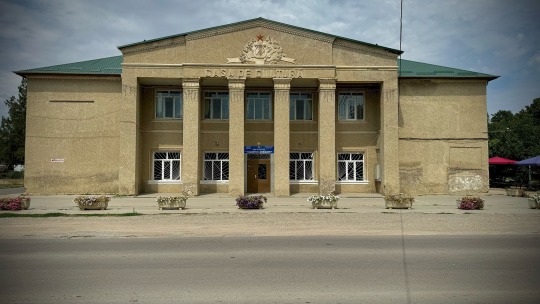
Ich beschließe ob der eher wenig spannenden Landschaft, Felder, Felder, Felder, nach einer Übernachtung Ausschau zu halten, aber das erste einigermaßen sinnvolle gibt es tatsächlich in Rumänien.

Vorher mangelt es an Siedlungen, und auch an Gründen, dort anzuhalten, denn ich komme irgendwie aus dieser Russlandblase nicht raus. Denn ich durchquere die nächste abtrünnige Provinz. Nicht komplett abtrünnig, aber doch Moskau zugewandt, ist Gagausien aber doch nichts weiter als ein Streifen Schwarzerde mit kyrillischer Beschriftung. Ich kaufe einen Kwas. Большое, конечно.
Es ist heiß und staubig, 37°. Rechts von mir braut sich ein Gewitter zusammen, dem ich aber mit Überfahren der Grenze entgehe. Galati lasse ich liegen, und nun wird es hügelig und die Landschaft ändert sich.

Ich fahre direkt nach Tulcea, dort baue ich mein Zelt für zwei Nächte auf und werde morgen mal eine Tour durchs Delta machen. Nicht wie in New Orleans mit dem Kanu, sondern mit einem Motorboot. Aber jetzt geht es erst mal ins Zelt.
2 notes
·
View notes
Note
Just a little question, Sol - do your characters have middle names? Or other names? Is there any reason for or meaning behind their names? I've been thinking about how and why my characters are named - not by me but within the confines of the story - so it made me wonder about how other writers' OCs get their names. (Example, as I wrote in a previous story - Drew is actually "Andrew Dean Thorton III" but his family took away the "Third" when he came out because they assumed he'd never have a kid.).
Thanks!
Hmm story reasons hmmm
Isaiah's mother was the one to name all the three boys. She was very much a law and history nerd, and she liked religious and mythological stories. Isaiah comes from Hebrew and means salvation and protection. It was also the name of a prophet. While Isaiah's parents weren't religious, his mother had the right idea about him being a gentle compassionate guide.
Hector is directly inspired by Hector from Iliad. Greatest warrior of Troy and a Prince. Also the name means steadfast or holding fast, so a powerful name. His mother wasn't off with this one either.
Arnie as a human and the youngest just seemed very vulnerable to her. She named him literally after Arnold Schwarzenegger, someone strong, resilient, sturdy and charismatic. Arnie doesn't have the muscle or the power, but he is a charming bearer of the name.
Seline's name literally means "the moon" and it was a way of her mother honoring her father's wolf origins. Nobody actually believed Seline's rare non-practising witch grandfather would have any real influence or heritage or that Seline would turn out to be a witch herself. The name fits all the more. Fun fact is that in her mother tongue of Slovak, her name is Seléna, but she introduces and writes herself Seline in Austria so it's easier to fit in and pronounce. Her last name Silverstein is actually her own loose translation of her real last name Strieborská, that nobody could ever say and it got on her nerves to be so obviously not-German. Silverstein implies a Western pack affiliation, which is a lot safer than the Eastern Europe association since lots of wolf clans there were lost to the Communism regime of Sowjets before the Fall of Iron Curtain.
Dylan comes from Welsh and means "sea", which is ironic considering Seline's element is water. Their mother loves sea very much and they have a very good connection to it, but she actually named him after her favourite actor, lol.
Margaret, Matthew's mother, named all her children with names starting with M. From oldest to youngest: Melissa (28), Matthew (23) Madolyn (22), Meredith (18) and Marcie (10).
Rip got the name from other street strays for his reputation, being highly effective in ripping people to shreds and sending to early grave R.I.P. It's not his real name and he hides it, in case someone wanted to imprison him for the crimes connected to it (which is a huge spoiler).
Levi is actually a common surname in Slavic countries and means "Lion". Levi gave up his first name, when he became an Executioner in Western Europe and made his last name his first name, to make himself unaffiliated to any clan or pack. He always introduced himself as Levi + whatever pack he was currently in for his surname. Without a pack, he simply stays Levi.
(Levi, Seline and Dylan are from powerful Slavic wolf clans from Eastern Europe in the middle of predominently German speaking Western Europe pack politics, lol)
#myocs#werewolf wip#worldbuilding#? I guess#look at all the things inside names#thanks for the question Lis! :)
2 notes
·
View notes
Text
Empfehlenswerter F.A.Z. Beitrag: App ins Studium
Verzetteln, aber wie!
1. Durchgehend, auch durch alle Medien
2. Kein Tag und Nacht ohne Linie
3. Keine Linie ohne Welle
4. Keine Welle ohne Kehren
Der Zettelkasten habe ausgedient, behauptet ein Optimist. Wenn der ausgedient hat, dann bin ich ausdifferenziert, endlich ausdifferenziert. Solange organisiere ich einen fröhlichen Pessimismus. Verzettelung geht durch alle Medien, geht sie nicht durch den Zettelkasten, dann stimmt etwas nicht. Tumblr ist doch nur die Spitze eines Eisbergs, hätte man nicht für die private Praxis öffentlicher Dinge ein Geschichte und eine Geschichte an Zettelkästen parat und wäre der Apparat nicht historisch geschichtet, dann würde nichts helfen. Manchmal tauchen auf dem Tumblr Zettel auf und sind flugs wieder entfernt, aber doch nicht weg. Sie sind dann in anderer Entfernung, zum Beispiel privater gestellt oder wieder auf Papier zurückgeführt. Vorbild Warburg! Hinter den Tafeln, die als Zettelkästen agieren, agieren Zettelkästen, dahinter eine Bibliothek, die als Zettelkasten agiert, dahinter Warburg, der als Zettelkasten agiert. Der Zettelkasten ist auch ein Schema, Begriff und Metapher, auch ein Objekt, das lässt, in dem Fall verzetteln lässt.
Wer einen Zettelkasten führt, um die Verzettelung loszuwerden, braucht damit gar nicht erst anfangen. Stadtteilhistoriker Norbert, der beste Stadtteilrater (Mitglied des Sowjets der Urbanpartisan) in Bockenheim , der begreift das Verzetteln als eine Arbeit am Begriff. Arbeitet nie, funktioniert nie! Verzetteln arbeitet und begreift aber noch da, wo man Begreifen nicht als Arbeit und Arbeit nicht als Begreifen fasst, arbeitet nicht immer, arbeitet sogar nie, arbeitet nur durchgehend.
2 notes
·
View notes
Text
Der Berg der Kreuze: ca. 50.000 Kreuze stehen mittlerweile dort. Entstanden als Ort des Widerstandes gegen die sowjetischen Besatzer. In Litauen hatten große Bevölkerungsteile mit den Nazis zusammen gearbeitet, ca. 20% der Bevölkerung waren Juden, die gemeinsam „eliminiert“ wurden. Die Sowjets deportierten nach 1945 Tausende in die Gulags. Zum Gedenken an die Verschollenen und Verstorbenen entstand in den 70er Jahren ein Berg voller Kreuze. Der Platz wurde mehrfach platt gemacht,am nächsten Tag standen wieder Kreuze da. Es ist heute ein internationaler Wallfahrtsort - und der Papst war auch schon da…
Nach ca. 2200 Fahrkilometern erreichen wir Lettland/Latvia. Die Straßen sind genauso schlecht, wie in Litauen. Andy, der Berliner, der in Finnland und Estland wohnt, gab uns den Tipp, Ost-West-Straßen zu meiden, die wären noch schlechter. (Waschbrettpisten).
An einem wunderschön einsamen See treffen wir Andi mit seiner estnischen Freundin Viktoria. Mein Notizbuch ist nun voll mit Tipps für unsere Reise. Und das Tollste: Wir sind am Freitag eingeladen, mit ca. 100 anderen hoffentlich netten Letten Midsommer zu feiern. Irgendwo in der Wallachei an einem Fluß. Die Städte werden leergefegt sein, alle sind draußen, springen mit Blumenkränzen im Haar übers Feuer und freuen sich. Wir sind gespannt und haben schon mal ne Flasche Vodka gekauft. Oder Wodka? Prost auf russisch heißt nicht etwa „nastarowje“ sondern „sastarowje“.
Der Infoabend wird nur unterbrochen von zwei gewaltigen Gewittern, die haben wir ganz in Seglermanier abgewettert.
Übrigens: In Lettland wird überwiegend russisch gesprochen. War uns nicht klar, erklärt sich aber aus der langen russischen Herrschaft.
20. Juni 2023 km 2.320 Riga.
Stadtnaher Campingplatz auf einer Flußinsel. Zu Fuß über die riesige Brücke in die sehenswerte Altstadt. Bischof Albert von Bexhövede (bei Bremerhaven) gründete ca. 1200 die Stadt. Ein Grund, warum die Stadt eine enge Partnerschaft zu Bremen hat. Die Stadtmusikanten und der Roland legen davon Zeugnis ab. Hier wollen wir zwei Nächte bleiben. Es sei denn, wir werden durch eine Konzertbeschallung vom Schlafen abgehalten.

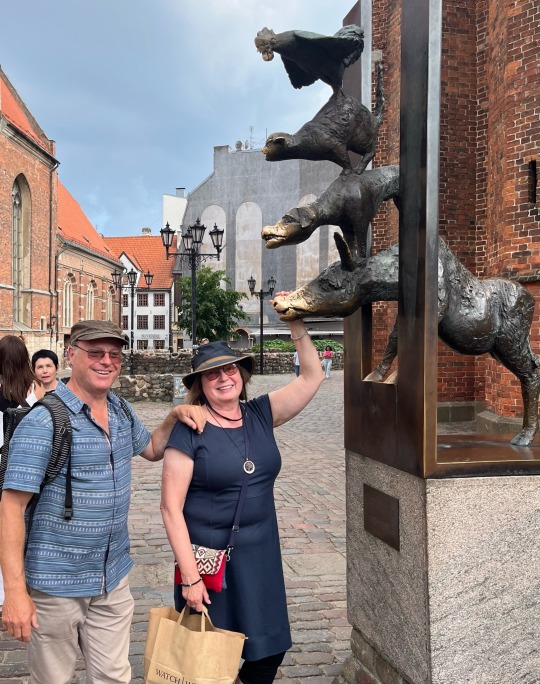
Angela und Hans inkognito in Riga:
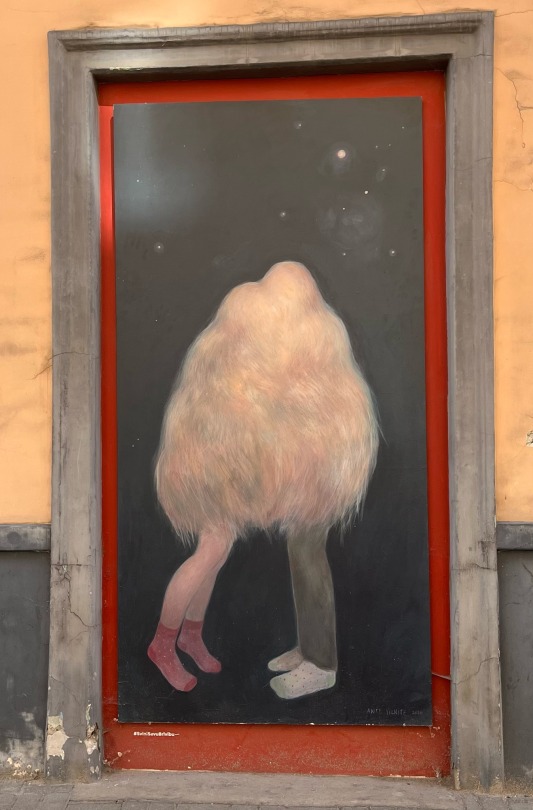
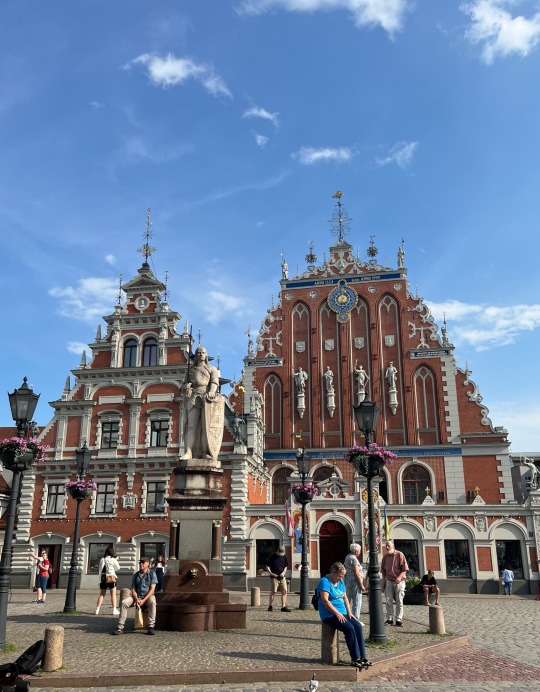


Die erste Nacht ist überraschend ruhig und mückenfrei. Heute auf den Markt in der alten Zeppelinhalle.
2 notes
·
View notes
Text
„Uhri, Uhri“ Wie die Sowjets sich inszenierten und plünderten
Die JF schreibt: »Das Bild der Sowjetflagge über dem zerstörten Reichstag ist ein bekanntes Bild aus dem Zweiten Weltkrieg. Die Geschichte dahinter ist weniger heldenhaft, als das Motiv suggeriert. Dabei ist es nur eine Lappalie im Vergleich zum allgemeinen Vorgehen der Sowjets. Dieser Beitrag „Uhri, Uhri“ Wie die Sowjets sich inszenierten und plünderten wurde veröffentlich auf JUNGE FREIHEIT. http://dlvr.it/TKWV7G «
0 notes
Text
Vor 80 Jahren: Torpedos versenken NS-Schiff "Wilhelm Gustloff"
Es ist das Todesurteil für Tausende Flüchtlinge an Bord: Heute vor 80 Jahren treffen russische Torpedos das NS-Schiff.
0 notes
Text
Tim und Struppi in der Urfassung: Die Originalfassungen bei Carlsen (1992–1996) Die Comicreihe „Die Abenteuer von Tim und Struppi“ von Hergé begeistert seit Jahrzehnten Leser weltweit. Zwischen 1992 und 1996 veröffentlichte der Carlsen-Verlag eine besondere Edition dieser Klassiker: die Urfassungen der frühen Tim-und-Struppi-Comics. Diese Hardcover-Neuausgaben präsentieren die Geschichten in ihrer ursprünglichen Erstfassung, also so, wie sie ursprünglich in den 1930er- und 1940er-Jahren erschienen – schwarzweiß statt nachträglich überarbeitet oder koloriert. Damit unterscheiden sie sich deutlich von den bekannteren, später überarbeiteten und kolorierten Alben. Im Folgenden beleuchten wir die Besonderheit dieser Reihe, die Gründe für frühere Änderungen an Hergés Comics, die Gestaltung und das Format der Carlsen-Edition sowie ihre historische und sammlerische Bedeutung. Originale Schwarzweiß-Abenteuer vs. überarbeitete Ausgaben Der Kern dieser Carlsen-Reihe liegt in der Veröffentlichung der ursprünglichen Originalfassungen der frühen Abenteuer. Hergé hatte viele frühe Geschichten Jahrzehnte zuvor nachträglich angepasst – er zeichnete sie zum Teil um, montierte Seiten neu und kolorierte sie, um sie einem neuen Standard anzupassen. In der Carlsen-Edition dagegen wurden genau diese Geschichten erstmals wieder in ihrer Urfassung gezeigt. Konkret handelt es sich um die Bände 0 bis 8, also die ersten neun Abenteuer der Serie, beginnend mit Tim im Lande der Sowjets (Band 0) und endend mit Die Krabbe mit den goldenen Scheren (Band 8). Diese Ausgaben zeigen Tim und Struppi so, wie Hergé sie ursprünglich konzipierte: Band 0: Tim im Lande der Sowjets – Das allererste Tim-und-Struppi-Abenteuer (1929/30), ursprünglich in einer Zeitung in Schwarzweiß erschienen und nie koloriert. Band 1: Tim im Kongo – Tims zweites Abenteuer (1930/31), erstmals 1931 als s/w-Album veröffentlicht; 1946 von Hergé vollständig neu gezeichnet und in Farbe herausgebracht (1975 nochmals leicht überarbeitet). Band 2: Tim in Amerika – (1931/32) ursprüngliche Fassung in Schwarzweiß, später farbig angepasst. Band 3: Die Zigarren des Pharaos – (1932–1934) zuerst als s/w-Serie, in den 1950ern koloriert und ummontiert. Band 4: Der Blaue Lotos – (1934/35) ursprünglich s/w, später farbig. Band 5: Der Arumbaya-Fetisch (auch Das zerbrochene Ohr) – (1935/37) s/w-Originallayout, später farbiges Album. Band 6: Die Schwarze Insel – (1937) Original in Schwarzweiß; Hergé schuf hier sogar mehrere Versionen (eine kolorierte 1943 und eine überarbeitete Neuzeichnung 1966 für England). Band 7: König Ottokars Zepter – (1938/39) zunächst s/w veröffentlicht, nach dem Krieg farbig neu herausgegeben. Band 8: Die Krabbe mit den goldenen Scheren – (1940/41) zuerst als s/w-Zeitungsstrip publiziert, 1944 folgte ein farbiges Album. Man erkennt bereits: Alle diese frühen Abenteuer erschienen ursprünglich schwarzweiß. Spätere Ausgaben, die den meisten Lesern vertraut sind, wurden koloriert und teils um Inhalte bereinigt oder angepasst, um z.B. auf 62 Seiten im Farb-Albumformat zu passen – dem damals neuen Industriestandard. Die Carlsen-Urversionsreihe hebt sich dadurch ab, dass sie die unverfälschten Originale dieser Geschichten bietet, ohne die nachträglichen Änderungen. Leser können dadurch Unterschiede entdecken, etwa fehlende oder abweichende Szenen, ursprüngliche Zeichenstile und historische Kontexte, die in den gängigen Alben so nicht mehr enthalten sind. Technische und politische Gründe für Hergés Überarbeitungen Warum wurden die Tim-und-Struppi-Comics überhaupt überarbeitet? Die Gründe dafür waren oft technischer Natur, teils aber auch politisch bzw. inhaltlich motiviert. In den 1930er Jahren erschienen Hergés Comics zunächst in Zeitungen und Magazinen, wo Farbdruck entweder technisch nicht möglich oder zu teuer war. Daher waren die ersten Geschichten zwangsläufig schwarzweiß. Erst später, als der Erfolg wuchs und der Verlag Casterman ab 1942 ein einheitliches
farbiges Albumformat etablierte, passte Hergé seine frühen Bände an: Er kolorierte sie nachträglich und montierte die ursprünglich oft unterschiedlich langen Fortsetzungsgeschichten auf das einheitliche Album-Layout um. Dabei mussten teilweise Panel-Größen geändert oder ganze Szenen gekürzt werden, um ins vorgegebene Seitenraster zu passen. Ein Beispiel ist Tim in Amerika, das für die Farbausgabe eingekürzt wurde, oder Der Arumbaya-Fetisch, wo Seiten neu angeordnet wurden. Gestaltung und Format der Carlsen-Faksimile-Edition Das Cover der Carlsen-Urfassung von „Die Krabbe mit den goldenen Scheren“ (Band 8) im typischen Design der Reihe. Die Carlsen-Neuausgaben erschienen unter dem Label „Carlsen Studio“ und sind hochwertig aufgemachte Hardcover-Alben im großzügigen Albumformat (22,5 × 30,0 cm). Dieses Format entspricht dem klassisch-frankobelgischen Comic-Album und lässt die detailreichen Zeichnungen Hergés voll zur Geltung kommen. Auffällig ist das einheitliche Reihen-Design: Die Cover sind überwiegend weiß gehalten mit einem farbigen Leinentrücken (z.B. roter Buchrücken) und zeigen den originalen Titelschriftzug sowie das ursprüngliche Titelbild oder eine Schlüsselszene der jeweiligen Geschichte. Dabei wird teils auf Farbe verzichtet – einige dieser Urfassungen sind komplett schwarzweiß (einfarbig), während andere Ausgaben teilweise vierfarbig sind. Diese Angabe „teils einfarbig, teils vierfarbig“ bezieht sich darauf, dass einige Geschichten in ihrer Erstveröffentlichung nur Schwarzweißzeichnungen enthielten (z.B. Sowjets, Kongo, Amerika), während wenige spätere bereits einzelne Farb-Elemente oder farbige Titelbilder aufwiesen. Der Band Die Krabbe mit den goldenen Scheren etwa enthält im Carlsen-Faksimile die schwarzweiße Urfassung von 1941, inklusive des ursprünglichen Titelbildes (das hier auf dem Cover zu sehen ist). Jeder Band dieser Reihe wurde liebevoll als Faksimile-Ausgabe gestaltet – das bedeutet, dass Layout, Zeichnungen und sogar die Seitengestaltung möglichst originalgetreu dem historischen Original nachempfunden sind. So umfassen die Bände oft mehr Seiten als die regulären 62-Seiten-Alben, da die Originalversionen meist länger waren (z.B. 100 Seiten bei Die Krabbe mit den goldenen Scheren in der s/w-Fassung). In einigen Fällen wurden redaktionelle Seiten ergänzt, welche die Entstehungszeit erläutern, um dem Leser den Kontext zu vermitteln. Insgesamt vermittelt die Gestaltung den Eindruck, ein Stück Comicgeschichte in Händen zu halten – unterstützt vom nostalgischen Design und hochwertigen Druck. Historische Bedeutung und Sammlerwert der Urfassungen Aus heutiger Sicht haben diese Carlsen-Urfassungsbände einen hohen historischen und sammlerischen Stellenwert. Zum einen bieten sie Comic-Liebhabern und Tintinologen die Chance, Hergés Werk in seiner ursprünglichen Form zu studieren – mit allen Unterschieden, die über die Jahre verloren gingen. Sie fungieren damit auch als zeitgeschichtliches Dokument: Man erkennt den Einfluss der 1930er-Jahre in Sprache und Zeichnung, ungeschönt durch spätere Retuschen. Zum anderen sind die 1992–1996 erschienenen Alben selbst zu raren Sammlerstücken geworden. Die Auflage war vergleichsweise gering und wurde seitdem nicht erneut in dieser Form aufgelegt. Bereits kurz nach der Veröffentlichung wurden die Bände unter Fans begehrt, und heute werden komplette Sets oder Einzelbände der Reihe zu hohen Preisen gehandelt. Fazit: Die Carlsen-Edition „Tim und Struppi – Die Abenteuer von Tim und Struppi (Urfassung)“ aus den 90er-Jahren ist eine einzigartige Hommage an Hergés Originalarbeit. Sie zeigt die weltbekannten Abenteuer von Tim und Struppi in ihrer ursprünglichen Form – ein spannender Einblick für Fans, ein wichtiges Stück Comicgeschichte für Historiker und ein Schatz für Sammler. Durch die aufwendige Faksimile-Gestaltung im großen Albumformat, teils in Schwarzweiß, bleibt das Leseerlebnis authentisch. Diese Originalausgaben erinnern daran, wie sehr sich Comics im Laufe der Zeit
technisch wie inhaltlich wandeln können, und ehren das Vermächtnis von Hergés Tim und Struppi in all seiner historischen Tiefe.
0 notes
